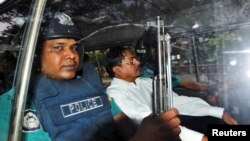The execution of a senior leader of Bangladesh’s largest Islamist party for his involvement in war crimes committed during the 1971 war has sparked mixed reactions in the country.
Supporters of Bangladesh’s war crime trial carried out victory rallies in Dhaka and other cities after the hanging of the third most senior leader of Jamaat-e-Islami (JeI), saying that the Islamist leader deserved the punishment of death for his actions during the war to break away from Pakistan.
“Hanging of war criminal [Mohammad] Kamaruzzaman is indeed justified. Capital punishment is the only way to punish a criminal like him who committed so grave crime against humanity,” said Imran H. Sarker, a leader of Dhaka’s Gonojagoron Mancho or national awakening platform, a group that supports Bangladesh’s war crime tribunal.
Protesting against Saturday’s hanging, Islamist groups called Mohammad Kamaruzzaman a martyr following what they said was a politically motivated trial.
According to the judgment of Bangladesh’s International Crimes Tribunal (ICT), a judicial body set up by the ruling Awami League-led government in 2010 to investigate and prosecute war crimes, on July 25, 1971, Kamaruzzaman led Pakistani soldiers who massacred at least 144 men in a central village of Sohagpur that later became known as “village of widows.”
Death penalty
ICT found Kamaruzzaman guilty on five out of seven counts of torture and mass killing. In May 2013, he was given the death penalty for his role in the killings of unarmed farmers of Sohagpur which was described by the prosecution as one of the war's bloodiest single episodes.
Kamaruzzaman denied all charges and maintained the trial as well as the punishment was politically motivated.
He lost his final appeal last week when his review petition against the death sentence was dismissed by Bangladesh’s highest court.
The United Nations, European Union and United States had urged Bangladesh government not to carry out the execution. The U.S. State Department released a statement that noted what it called “the judicial rigor applied to this ruling,” but said it could not support proceeding with executions because the tribunal still does not meet international standards.
Kamaruzzaman had refused to petition the president to commute his sentence to life in prison. But Abbas Faiz, Bangladesh researcher at Amnesty International said that should not have been necessary.
“We know that in this case Kamaruzzaman did not file a mercy petition, but that should not have stopped the president from commuting his sentence, for example to life imprisonment.”
Bangladesh hanged the 63-year-old Islamist leader in the Dhaka central jail on Saturday.
Defense lawyers in the case alleged that the tribunal was biased in favor of the ruling Awami League party and that they had not been allowed to present as many witnesses as the prosecution.
JeI is a member of the opposition BNP-led coalition in Bangladesh.
In a statement issued to the news media, JeI leader Makbool Ahmed called the move, “a conspiracy to wipe out Jamaat-e-Islami party, Bangladesh government is in a desperate mission to kill the top leaders of our party."
'Village of Widows' reacts to execution of war criminal
Tureen Afroz, one of the prosecutors, said that ICT was constituted to carry out justice in the cases of the war crimes, and proceeding with the execution was the right course of action.
“Otherwise, it will introduce a culture of injustice in the country and the new generation will not be able to differentiate between justice and injustice or truth and falsehood," she said.
Some witnesses from Sohagpur, where the 144 men were killed in the war, testified in the court that the Islamist leader, who was around 19 years old at the time, led Pakistani troops to the village.
Mohammad Jalaluddin, who escaped the 1971 attack in Sohagpur and was among the witnesses in the ICT in the case, said that the survivors and their families are happy with the execution.
“Kamaruzzaman guided the Pakistani soldiers into our village. Now as he has been hanged, the widows and the children of the martyrs welcome it,” said Jalaluddin.
Hafiza Bibi, 65, a trial witness who lost her husband during the attack on Sohagpur, said she was thankful to Allah for being able to witness the justice delivered in her lifetime.
“They murdered all the men in the village they found. They killed my husband," she said. "They also killed eight of my uncles and cousins. They killed all men in our greater family. My life has been full of miseries since then.”
She said the trial and execution has brought a measure of peace to the village, many years later.




